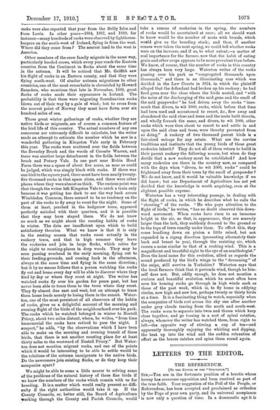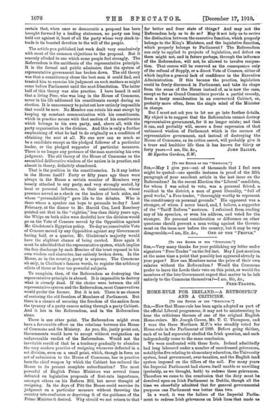LETTERS TO THE EDITOR.
THE REFERENDUM.
[To THE EDITOR 01THZ "SPECTATOR.."]
Sut,—You are in the fortunate position of a heretic whose heresy has overcome opposition and been received as part of the true faith. Your suggestion of the Poll of the People, or Referendum, has been accepted and proclaimed as orthodox by the Pope of your own party, and its universal acceptance is now only a question of time. In a democratic age it in certain that, when once so democratic a proposal has been brought forward by a leading statesman, no party can long hold out against it, least of all the party whose very stock-in- trade is its boasted devotion to the will of the people.
The article you published last week dealt very conclusively with moat of the common objections to the propoaaL But it scarcely alluded to one which some people feel strongly. The Referendum is the antithesis of the representative principle. It is the formal and public admission that the system of representative government has broken down. The old theory was that a constituency chose the best man it could find, and trusted him to exercise his judgment on such matters as might come before Parliament until the next Dissolution. The latter half of this theory was also practice. I have heard it said that a living Peer, who was long in the House of Commons, never in his life addressed his constituents except during an election. It is unnecessary to point out how entirely impossible that would be now. No Member can retain his seat except by keeping up constant communication with his constituents, which in practice means with that section of his constituents which belongs to his own party, and, above all, with the party organisation in the division. And this is only a further emphasising of what he had to do originally as a condition of obtaining the seat at all. No one now can so much as be a candidate except as the pledged follower of a particular leader, or the pledged supporter of particular measures. There is no longer any pretence of the man exercising his own judgment The old theory of the House of Commons as the assembled deliberative wisdom of the nation is in practice, and almost in theory, definitely abandoned.
That is the position in the constituencies. Is it any better in the House itself? Forty or fifty years ago there were always in the House a certain number of Members very Loosely attached. to any party, and very strongly seated, by Local or personal influence, in their constituencies, whose presence served as a check on the leaders of both sides, and whose " persuadability " gave life to the debates. Who is there whom a speaker can hope to persuade to-day ? Last February, at the dinner to Mr. Harold Cox, Lord Rosebery pointed out that in the "eighties," less than thirty years ago, the Whips on both sides were doubtful how the division would go on the Vote of Censure moved by the Opposition against Mr. Gladstone's Egyptian policy. To-day no conceivable Vote of Censure moved by any Opposition against any Government having half, or a quarter, Mr. Gladstone's majority would have the slightest chance of being carried. Here again it must be admitted that the representative system, which implies the free discharge by each Member of the trust reposed in his own wisdom and character, has entirely broken down. In the House, as in the country, party is supreme. The Commons sit only, in Chatham's famous words, to register the arbitrary edicts of three or four too powerful subjects.
To complain, then, of the Referendum as destroying the representative principle is absurd. It is impossible to destroy what is already dead. If the choice were between the old representative system and the Referendum, most Conservatives would prefer the former. But it is not. There is no chance of restoring the old freedom of Members of Parliament But there is a chance of securing the freedom of the nation from the tyranny of a party caucus acting through a party Cabinet. And it lies in the Referendum, and in the Referendum alone.
There is one other point. The Referendum might even have a favourable effect on the relations between the House of Commons and the Ministry. As you, Sir, justly point out, Governments would have to accept without resignation an unfavourable verdict of the Referendum. Would not the inevitable result of that be a tendency gradually to abandon the very modern practice of resigning whenever defeated in a set division, even on a small point, which, though in form an act of submission to the House of Commons, has in practice been the chief weapon by which the Cabinet has reduced the House to its present complete subordination P The most powerful of English Prime Ministers was several times defeated on legislative proposals of first-rate importance, amongst others on his Reform Bill, but never thought of resigning. In the days of Pitt the House could exercise its judgment on a particular measure without throwing the country into confusion or depriving it of the guidance of the Prime Minister it desired. Why should we not return to that far better and freer state of things ? And may not the Referendum help us to do so P May it not help us to revive the distinction between the executive function, which properly belongs to the King's Ministers, and the legislative function, which properly belongs to Parliament ? The Referendum can only be applied to projects of legislation, and defeat on them might not, and in future perhaps, through the influence of the Referendum, will not, be allowed to involve resigns- tion. That course will be reserved. as the consequence only of the refusal of Supply, or a direct Vote of Censure, either of which implies a general lack of confidence in the Executive Administration. If this became the practice, legislation could be freely discussed in Parliament, and take its shape from the sense of the House instead of, as is now the case, except so far as Grand Committees provide a partial remedy, from a hasty consideration in an overworked. Cabinet, or, probably more often, from the single mind of the Minister in charge.
But I must not ask you to let me go into further details. My object is to suggest that the Referendum cannot destroy representative government, for it no longer exists; and that it can, and probably will, secure a freer expression of that unbiassed wisdom of Parliament which is the essence of representative government, and instead of destroying the House of Commons, as its critics assert, will probably give it a truer and healthier life than it has known for thirty or
20 Egerton Gardens, S.W.























































 Previous page
Previous page